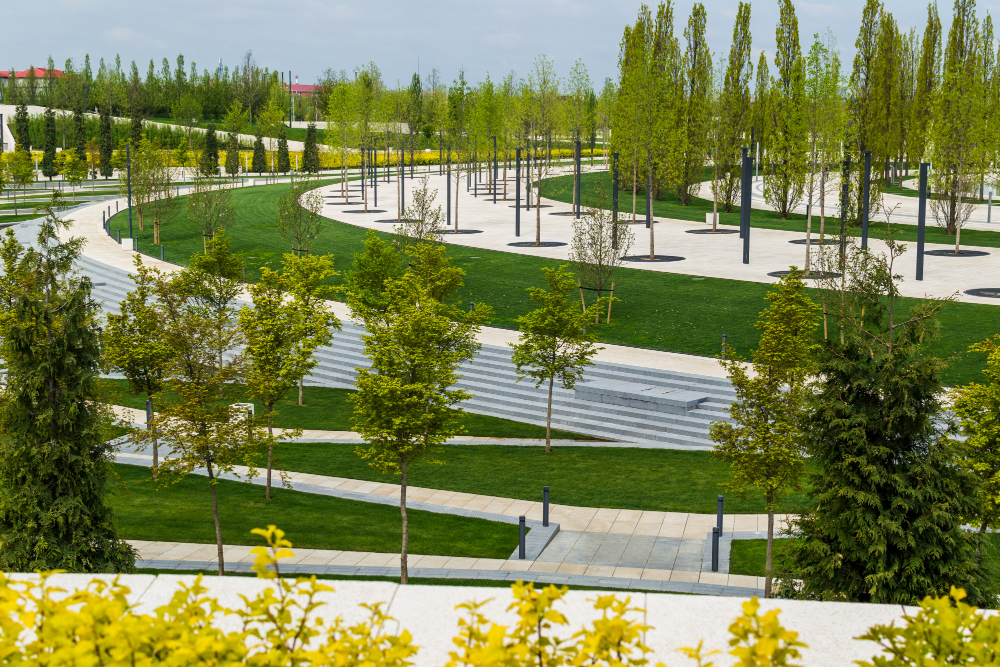It involves planning parks, gardens, urban green spaces and entire public landscapes in ways that improve quality of life, protect the environment and respond to community needs. If you’re interested in design, nature, sustainability and how people interact with their environment, Landscape Architecture could be a great fit for your studies.
What Is Landscape Architecture Like at University?
Landscape Architecture blends creativity, science and social awareness. You’ll learn how to design outdoor spaces by studying site planning, ecology, environmental design, planting schemes and land use. The course combines studio-based design projects with technical subjects like hydrology, topography, soil science and sustainability. You’ll develop your own design ideas and present them through sketches, models, digital drawings and written reports. A key part of the course is understanding how landscapes affect people’s health, wellbeing and connection to nature.
How Long Does It Take and What Are the Options?
In the UK, most students begin with a three-year BA or BSc in Landscape Architecture or Landscape Design, followed by a two-year postgraduate degree (MLA) to qualify as a professional landscape architect. Some universities offer an integrated master's degree over four or five years. Courses are accredited by the Landscape Institute (LI) and usually include opportunities for placements, site visits and working with real clients. You can also study landscape-related subjects like Urban Design, Environmental Planning or Garden Design, depending on your interests.
How Will You Be Taught and Assessed?
You’ll learn through a mix of studio projects, fieldwork, lectures, seminars and technical workshops. You’ll work on real-world design briefs, use GIS and CAD software and produce visual presentations of your work. Assessment is largely project-based and may include portfolios, models, design reports, group projects and presentations. In later years, you’ll work on a major project that demonstrates your ability to design imaginative and practical landscapes.
What A Levels or Subjects Do You Need?
There is no single required subject, but useful A levels include:
Geography
Art or Design
Biology or Environmental Science
Mathematics or Technology
BTECs in Art and Design or Environmental Science are also accepted by many universities. Most courses ask for a portfolio showing design ideas, drawing skills or evidence of interest in the natural or built environment. A background in both creative and scientific subjects is helpful.
What Skills Will You Develop?
A Landscape Architecture degree helps you become a confident designer and problem solver. You’ll gain:
Creative thinking and spatial awareness
Technical skills in drawing, mapping and 3D modelling
Knowledge of ecosystems, plants and environmental processes
Understanding of sustainable development and climate adaptation
Communication and collaboration skills
Research and report writing
Project management and client engagement
These skills are highly valuable across the design, planning and environmental sectors.
What Can You Do With a Landscape Architecture Degree?
Most graduates go on to become professional landscape architects after completing their postgraduate training and chartership. Other career options include:
Urban designer or environmental planner
Public realm or streetscape designer
Garden designer or horticulture consultant
Parks and green infrastructure officer
Ecological or habitat restoration specialist
Landscape consultant for architecture or planning firms
Sustainable development or climate resilience adviser
You could work for design practices, local authorities, environmental organisations, or run your own consultancy. Some graduates go into teaching, research or related fields like urban regeneration, placemaking or community engagement.
Studying Landscape Architecture Abroad
Studying abroad can offer exposure to different climates, landscapes and planning systems. Here’s what you can expect in different countries.
USA
In the US, Landscape Architecture is offered as both an undergraduate (BLA) and a postgraduate (MLA) degree. Accredited by the Landscape Architectural Accreditation Board (LAAB), these programmes focus on ecology, urbanism and design. Schools like Harvard Graduate School of Design and UC Berkeley are internationally respected. The qualification route includes study, internships and licensure exams.
Canada
Canadian universities such as the University of Guelph and the University of British Columbia offer strong BLA and MLA programmes. Degrees often focus on environmental sustainability, Indigenous knowledge systems and climate change. Canada’s vast and varied landscapes offer excellent case studies for learning.
European Union
Landscape Architecture is widely taught across the EU, especially in countries like the Netherlands, Germany, and Sweden. Many programmes are offered in English. Schools such as Wageningen University and Hochschule Anhalt are well-regarded. EU programmes often emphasise ecological design, biodiversity and public engagement in planning.
Australia
Australian universities such as the University of Melbourne and the University of New South Wales offer accredited landscape architecture degrees. Courses often combine studio learning with environmental science and community design. Many programmes focus on adapting to climate extremes and bushfire-prone environments.
New Zealand
In New Zealand, universities such as Lincoln and Victoria University of Wellington offer landscape architecture degrees that respond to natural hazards, biodiversity and Indigenous Māori values. These degrees often include field trips and local community projects.
Before studying abroad, check if your degree is recognised in the country where you plan to work, as licensing and registration requirements vary.
Is Landscape Architecture the Right Course for You?
Landscape Architecture is ideal for students who want to combine creative design with environmental responsibility. It suits people who are visually minded, care about nature and communities and enjoy solving complex real-world challenges. Whether you're designing urban parks, restoring ecosystems or helping cities adapt to climate change, a degree in Landscape Architecture equips you with the knowledge and tools to shape more sustainable and inspiring places for future generations.





